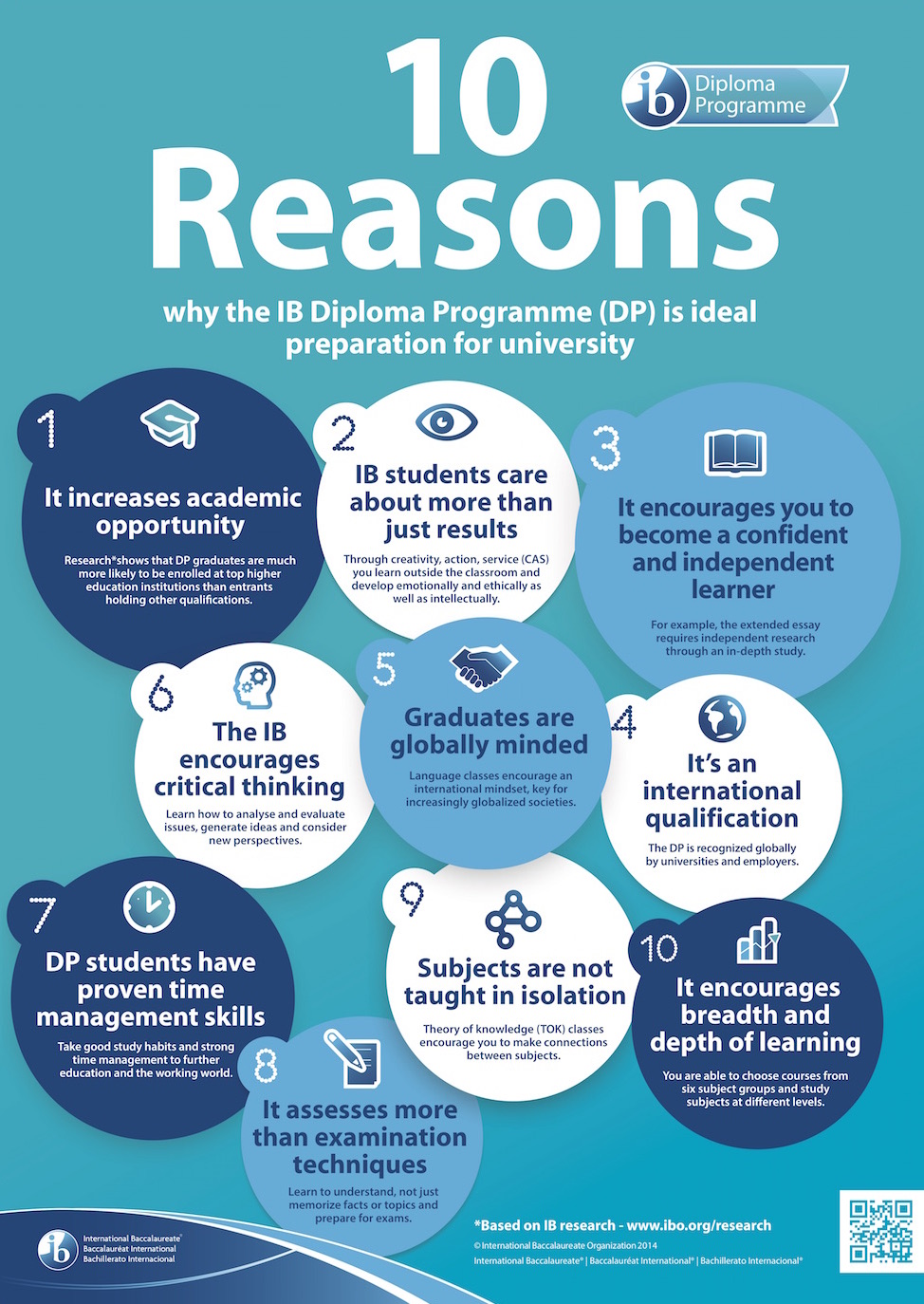IB Diploma Explained in Detail
The International Baccalaureate is an educational organisation started in Geneva by 10 existing Member Schools of the International Schools Association in the year 1968. The working parties to the International Baccalaureate include both University and secondary teachers who are tasked with the formulation of Syllabi and conducting Examinations worldwide. Since the initial years, the promotion of IB has been facilitated by the rigorous curriculum that IB offers and the quality of preparation exhibited by IB graduates after they entered post-secondary education.
Formulated in the year 1968 The International Baccalaureate Diploma Programme (IBDP)
was the first programme offered by the International Baccalaureate. The IB DP is a comprehensive two-year program that is delivered using an internationally standardized curriculum that includes rigorous common examinations marked by trained examiners from around the world. The programme is offered at the pre-university level for the students between the ages 16 and 19. The quality of the syllabus and the rigorous training that is offered to students has made IB Diploma programme the most sought-after secondary syllabus in International schools in various countries replacing the traditional 'A' level Programmes. The IB programme is structured n a unique was in order to develop the knowledge, skills and attitude of learners with diverse skills and aspirations. The programme is offered by a number of IB schools across multiple countries and it intends to develop inquiring and knowledge young people who promote a peaceful world through intercultural understanding and mutual respect.

IBDP at a glance:
- The International Baccalaureate (IB) Diploma Programme is a comprehensive two-year program delivered in grades 11 and 12 using an internationally standardized curriculum.
- Highly regarded internationally and accepted for entrance into universities around the world.
- The IB Diploma is currently being offered in over 3360 across the world.
- In International schools worldwide it is a better alternative to the traditional 'A' level courses offered by other international boards of education.
Advantages of IB Diploma:
- The students who finish an IB Diploma have a wide range of options available for higher studies in International Universities.
- The Acceptance rate of IB Diploma students in Top Universities in most countries is high.
- The students get to choose three subjects from a range of options, this facilitates interdisciplinary learning and this develops a broad knowledge base among students.
- The IB has in place an efficient Teacher Assessment Mechanism unlike in most other boards which helps maintain a constant check on the quality of teachers.
- IB Diploma offers the most rigorous curriculum at the pre-university level, this reflects on student performance at the University level.
- Owing to their vast knowledge base the IB Diploma students have more opportunities in research-oriented studies, in which they generally outperform their peers from others International curriculums.

IB Diploma Curriculum:

The IB diploma curriculum consists of the DP core and the 6 subject groups.
Made up of the three required components, the DP core aims to broaden students’ educational experience and challenge them to apply their knowledge and skills.
The three core elements are:
Theory of knowledge - TOK is essentially a thoughtful inquiry into different ways of knowing, and into different kinds of knowledge, TOK is composed almost entirely of questions. It is a method used to help students develop their ability to express their knowledge. The students write extensive essays on topics given to them.
The assessment for TOK is carried out through Oral presentation and a 1600 word essay. It offers students and their teachers the opportunity to reflect critically on diverse ways of knowing and on areas of knowledge.
Extended essay - The Extended Essay is an independent research work carried out by the student and ends with the submission of a 4000-word essay. The process develops the capacity to analyse and synthesise knowledge. Through the research process for the extended essay, students develop skills in:
- Formulating an appropriate research question
- Engaging in a personal exploration of the topic
- Communicating ideas
- Developing an argument.
Creativity, activity, service (CAS) - Students in IB Diploma are involved in a variety of activities alongside their academics under CAS. These activities are not assessed at any point. CAS enhances personal development by enabling learning through experience.
CAS is structured as follows:
- Creativity – Arts, and other experiences that involve creative thinking.
- Activity – Physical exertion contributing to a healthy lifestyle, complementing academic work elsewhere in the DP.
- Service – An unpaid and voluntary exchange that has a learning benefit for the student. The rights, dignity and autonomy of all those involved are respected.
The DP core is central to the ethos of IB and academically the IB diploma offers a range of over 30 subjects under 6 subject groups. The six subject groups are:
- Studies in language and literature - The IB Diploma requires a student to take up at least one language under the language and literature studies, selection of two languages would lead to a bilingual diploma. The subject consists of three courses:
- Language A: literature, which is automatically available in 55 languages and, by special request, for any other that has sufficient written literature
- Language A: language and literature, which is available in 17 languages.
- Literature and performance, which is automatically available in English, and by special request in Spanish and French.
- Language acquisition - The students are required to select at least one subject for this group. It is essentially a modern language study, that lays emphasis on the acquisition and use of language in a range of contexts and for different purposes. Under this, the student is exposed to different cultures through the study of a foreign language which makes him/her culturally sensitive and aware. The courses offered are:
- Language ab initio courses are for beginners (that is, students who have little or no previous experience of learning the language they have chosen). These courses are only available at standard level.
- Language B courses are intended for students who have had some previous experience of learning the language. They may be studied at either higher level or standard level.
- Individuals and societies - Under this group the student selects from an available list of subjects (all non-science subject), the list of available subjects are as follows:
- Business management
- Economics
- Geography
- Global politics
- History
- Information technology in a global society
- Philosophy
- Psychology
- Social and cultural anthropology
- World religions
-
Sciences - This is group consists of all the science subjects: Biology, Computer science, Chemistry, Design technology, Physics, Sports-exercise and health science an additional interdisciplinary subject is available which satisfies the criteria for both group 3 and 4 - Environmental systems and societies.
-
Mathematics - There are 4 courses available in the mathematics subject -
- Mathematical studies standard level
- Mathematics SL
- Mathematics higher level
- Further mathematics higher level
- The Arts - The subjects in the arts allow a high degree of adaptability to different cultural contexts. The emphasis is on creativity in the context of disciplined, practical research into the relevant genres. Five subjects are available to students at a higher level or standard level:
- Dance
- Music
- Film
- Theatre
- Visual arts
Assessment:

At the end of the two-year program, each IB Diploma student will:
- Take written examinations in each of the 6 subjects. These examinations and assessments are marked/moderated by external IB examiners. Each subject is graded on a scale of 1-7 (for a maximum possible total mark of 42 points)
- Submit 2 Essay Papers
- 1 essay paper to complete the Extended Essay component
- 1 essay paper in the Theory of Knowledge (TOK) course.
- Essay papers are sent to external IB examiners for marking.
- The papers will contribute up to 3 bonus points for the student.
- Complete the CAS requirement
The IB uses both external and internal assessment in the Diploma Program. The highest total that an IBDP student can achieve is 45 points.
The IB Diploma programmes offered by the International Baccalaureate is by far the comprehensive International curriculum at the 11th and 12th-grade level, since its introduction, the curriculum has been updated constantly keeping in line with changing needs of students and the professional world which makes the IB Diploma the best among secondary school curricula.
The IB is a very challenging curriculum and sometimes you require the help of an expert tutor to help you score the best grade. Vidyalai provides live online one to one classes from the comfort of your home, with the best IB teachers. We guarantee 100% satisfaction or your first lesson is completely free. Request your first lesson now.